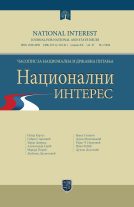- Home page
- Researchers
- Nevena Stanković
Nevena Stanković
Institut za međunarodnu politiku i privredu, Beograd

THE HUMAN SECURITY CONCEPT IN THE NATIONAL SECURITY STRATEGY 2019 – A STEP-BACK
In the recent years, a growing number of the developed states has incorporated the human security concept in their national security policies. Likewise, this trend has been noticed in a certain degree in the Republic Serbia since adopting the National Security Strategy in 2009. Yet, with the adoption of the new National Security Strategy in 2019, there has been some changes in that aspect. Having in mind the role and significance of the National Security Strategy in polistrategic system in the Republic Serbia, or the fact that it is the top strategic document of the hierarchy in the Republic Serbia, the author aims to analyze the scope of the implementation of the human security in the national security policy of the Republic Serbia, to identify existing indicators of the human security concept, but also to identify those that are unjustified missing. Speaking about the quality of life of an individual, as a key component of the human security concept, by comparative analysis of the National Security Strategy 2009 and the National Security Strategy 2019, the author attempts to point out present regression in the tendency of respecting the significance of an individual security and safety, along with highly emphasized accentuation of the state as a dominant referent object of the security. Furthermore, by content analysis of the National Security Strategy 2019, the author aims to introduce omissions and oversights in the phase of the security environment analysis, the identification of the key security challenges, risks and threats in the Republic Serbia, as well as in the phase of formulating national interests and specific goals for their realization, that conjointly result in (in some aspects) marginalized respect of the human security in the total national security. In the conclusion, beside recognized weak points and flaws, the author points out derelict topics that are significant for personal/individual security, but also suggests that the ignorance of the two phenomena- poverty and corruption – could potentially have major negative implications on the whole society. Eventually, the author calls for urgent and necessary adjusting, or, precisely, adding the human security concept to the state-centric approach.

FOREIGN POLICY OF THE EUROPEAN UNION IN THEORETICAL CONCEPT OF STRUCTURAL FOREIGN POLICY
The European Union (EU) is a system of foreign policy but also a global actor of international relations, which has been developing its own foreign policy for the last thirty years. The most articulate form of the EU foreign policy is the Common Foreign and Security Policy (CFSP). Additionally, relationship between the structures of the EU and the CFSP, is an important factor in the functioning of the EU institutional system. The large number of actors, both internally and externally, in the creation and implementation of the CFSP, makes difficult to understand its main institutional and political characteristics by traditional theories of international politics. After reviewing the traditional approaches to foreign policy of the EU, the paper will present the theoretical concept of the structural foreign policy. This theoretical approach relies on thesis that globalization as a political context, offers a new perspective on foreign policy, which has important implications for its understanding and analysis. Structural foreign policy tends to influence or shape sustainable political, legal, socio-economic, security and mental structures. These structures characterize not only by states and international relations, but also by societies, the position of the individual, the relationship between the state and society and the international system as a whole. The paper will show, how the conceptual framework of structural foreign policy is applied to political reality analysis.
